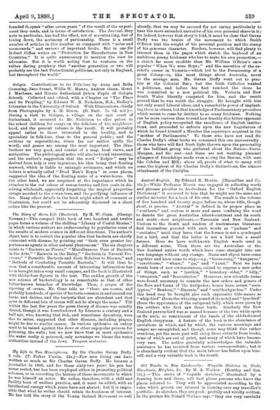My Life in Two Hemispheres. By Sir Charles Gavan Duffy.
2 vols. (T. Fisher Unwin. 32s.)—Few men living can have written so much as Sir Charles Gavan Duffy. He became a journalist in 1836, and for these sixty-two years his pen has never rested, but has been employed either in promoting political schemes, or in recording the history of those movements in which he was himself, an actor. He writes, therefore, with a skill and facility born of endless practice, and, it must be added, with an intellectual energy which years have not abated; but it is impos- sible that what he writes should retain its freshness of interest.
• He hai told the story of the Young Ireland Movement so well
already, that we may be excused for not caring particularly to hear the more extended narrative of his own personal share in it; for indeed, however that story is told, it must be clear that Gowan Duffy was the brains of the movement to which Smith O'Brien lent the weight of his personal position and the damp of his generous character. Readers, however, will find plenty to interest them in the pages which sketch the boyhood of an ambitious young Irishman who has to make his own promotion,— a sketch far more credible than Mr. William O'Brien's once popular " When We were Boys ; " and the narrative of the ex- rebel's career in Victoria—which led to the Premiership of a great Colony—is, like most things about Australia, novel to the average man. Mr. Gavan Duffy went out to prac- tise at the Colonial Bar ; but the Irish Catholics wanted a politician, and before his foot touched the shore he was committed to a new political life. Victoria and New South Wales literally competed for him, and the result proved that he was worth the straggle. He brought with him not only sound Liberal ideas, and a remarkable power of implant- ing them in others, but that knowledge of Parliamentary procedure which seems to come by instinct to so many Irishmen. Nothing can be more curious than to read how frankly this bitter opponent of English policy recognised the excellence of English institu- tions, and proceeded to enforce upon the new Legislature of which he found himself a Member the experience acquired in the "mother of Parliaments." To those who have not read Sir Charles Duffy's other books we commend this one unreservedly; those who have will find fresh light thrown upon the personality of the brilliant group who gathered about the Nation—Davis, Mangan, and the rest—and there are not wanting pleasant glimpses of friendships made even among the Saxons, with men like Cobden and Mill; above all, proofs of what to many will seem the highest of Sir Charles Duffy's distinctions, the sincere attachment of the Carlyles.


































 Previous page
Previous page